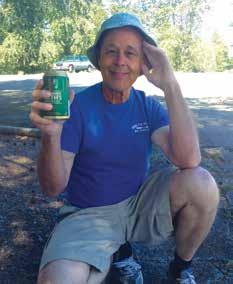
5 minute read
Charter Member Educators” of the MA-ALS Program
“Charter Member Educators” of the MA-ALS Program who taught the first cohort in 2008
Neil Boyd, LLM, Professor, SFU
Canadian Law and Legal System
Robert Gordon, PhD, Professor, and ALS Program Director, SFU
Selected Topics in Applied Legal Studies
David Macalister, LLM, Associate Professor, SFU Legal Philosophy
Graeme Bowbrick, LLM, QC, Adjunct Professor
Legal Research and Communication
George Cadman, QC, Boughton Law, Adjunct Professor
Real Property I and
Real Property II
Tony Wilson, QC, Boughton Law, Adjunct Professor
Contracts
Peter Ramsay, QC, Ramsay Lampman Rhodes, Adjunct Professor
Wills, Estates and Incapacity Planning
Marny Morin, Notary Public Society of Notaries Public
Selected Topics in Applied Legal Studies
Todd McKendrick, MBA, Adjunct Professor
Issues in Legal Practice
John Whatley, PhD, Former Program Director, Centre for Online and Distance Learning admission criteria in addition to the preferences of The Society of Notaries.
Slowly, the demographics of each incoming student body changed as did the size of each cohort, which grew considerably with each passing year.
The numbers of applicants did not dwindle, in part because, in many respects, a professional graduate program has an advantage over other university graduate programs. It has a connection to an area of professional employment following graduation, and as long as the student is successful in completing the professional training and other programs that had to be completed prior to being sworn in as a Notary, graduates pretty much had a job waiting at the end of the day.
The first cohort was selected in 2007 and 15 applicants began their coursework at the Surrey Campus of SFU in September 2008. That was a small but blessedly manageable cohort that, as it turns out, was about half the size of what would eventually become the standard cohort.
At one point, the cohort numbers swelled to such a degree where there were serious discussions about splitting the intakes with consequential financial and program coordination challenges. From the University’s perspective, that would have been a good move because the program was then able to pull its weight financially in both the short and longer terms.
Premium fees were contemplated at the outset but were not, and are not, being charged, primarily because of an earlier provincial policy that sought to encourage students to attend programs at the Surrey Campus of SFU where the MA-ALS Program was located.
At the time, MA-ALS was one of a handful of graduate programs that were physically located at what was then still a new (ish) SFU campus.
The first cohort mostly stayed with the Program, completed all their courses (some faster than others), and did well in passing the rigorous threepart final examination for the degree. The majority survived and eventually entered the Notary Public professional education program, and that became the norm for subsequent cohorts.
There were the inevitable casualties along the way (also known as the “melt”) as is the case with other professional degree programs. In law schools, for example, melts occur in December (the Christmas Melt) after the first-term experience, and again in the Summer. The Summer Melt is usually driven by a student’s selfevaluation of his or her suitability for the practice of law (as well as the meaning of life).
In the case of MA-ALS students, the melts appeared to be due to • their underestimation of the time and energy involved in completing three courses in a 13–14-week term; • their overestimation of their abilities to juggle study required for courses that have high expectations; • home commitments; and • employment expectations.
The majority had not set foot in a university for many years and had forgotten the skills required to successfully negotiate the institution. Some students faced significant language challenges because they were members of incoming migrant groups and were fairly recent arrivals in Canada.
Others were unacquainted with Canadian common law requirements and found much mystery in the whole affair. To be fair, however, the same can be said of those entering the MA-ALS
Program with a physical science or computing science background from a Canadian university.
Some held law degrees from their countries of origin where they had, in some instances, practised law; other students had other graduate degrees, including PhDs, in a range of disciplines. They were welcome additions to the MA-ALS Program although they posed special challenges for instructors who had to help the students wind back on their fundamental understanding of law in, for example, an East European or Middle Eastern jurisdiction, and then reset and wind forward for work in a common law Canadian jurisdiction.
The student advantage, in practice, lay in their special understandings of the communities they had targeted and would eventually serve, both culturally and linguistically. A Notary Public with an MA in ALS who had been schooled in law, for example in Poland, would likely be extremely attractive to Polish-born residents of particular communities in, say, Metro Vancouver. The same would likely be true of Notaries coming from the Philippines or from Punjab or Russia or Iran and so on.
There were many other challenges for the two teams including, what kinds of courses should be included in the ALS Program? Should the Program focus only on courses that could address the fundamentals of Notarial practice, as prescribed in the profession’s scope of practice, or should the Program push beyond, to stretch the minds of the students? (Enter, the Philosophy of Law course.)
Perhaps courses should be developed in contemplation of an expanded scope of practice for Notaries in the not-too-distant future and in support of the Provincial Government’s plan to improve access to justice for British Columbians?
The MA-ALS Program was always viewed as work in progress rather than an end game. Future work has to be undertaken in the synchronization of the SFU education component with the Notaries’ professional training program. The content of the MA-ALS courses is under continuous review and there is considerable interest in offering advanced courses in key and/or new areas of practice that could be sufficient in number and popularity to warrant the creation of a new Graduate Certificate in Applied Legal Studies.
In addition, we need to know more about our graduate body. What, for example, are the indicators of success both in the educational component and, later, in practice? They are important and researchable questions; the answers will inform ALS Program policy and practice for some time to come. s Professor Robert Gordon is Chair of the Applied Legal Studies Program Management Committee, Simon Fraser University (Surrey).








